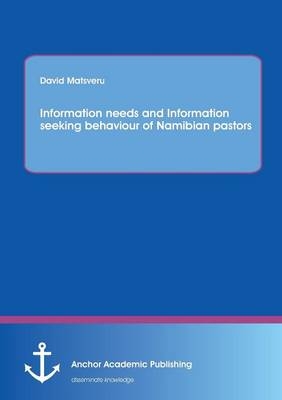
Information needs and Information seeking behaviour of Namibian pastors
Anchor Academic Publishing (Verlag)
978-3-95489-299-0 (ISBN)
Text Sample:
Chapter 2.5, Perceptions of pastors on their preparedness to meet their job demands:
Judging oneself is not an easy task. The Bible (Romans 12:3) encourages believers to evaluate themselves not highly but with sober judgement . Pastors are employed in one of society s most demanding professions and many church members may place unrealistic expectations on them. The Barna Group (2006) conducted a study with a representative sample of 627 senior pastors of Protestant churches in America on how they think of themselves and the churches they serve. The study revealed that pastors are self-confident in many areas of their ministry (Bible teaching, leading, disciple-making, etc.). Age was also shown to influence self-perception. The boomers (aged between 41-59) said they had few close friends. Pastors above 60 years of age felt inadequately recognised for their efforts, while young pastors (aged between 22-40) described themselves as both introverts and risk-takers. In general, pastors struggle to maintain genuine friendships with others (Barna, 2006). This is in agreement with a research conducted by FICG (1991) in which 70% of the participants revealed that they did not have friends. The study revealed that risk taking decreased with the number of years in service. This shows that pastors are not different from people from other walks of life and that they do not view themselves as super humans.
In the Barna Group (2006) study mentioned above, findings showed that black pastors were more likely than white pastors to describe themselves as introverts and significantly more likely to feel under-appreciated. While the majority of pastors described their churches as theologically conservative and effective at disciple-making, the Barna Group argue that there are conflicts between pastoral self-perceptions and the condition of their congregations. They suggest that there is need for pastors to find tools and methods to evaluate themselves and their ministries.
Generally, one would assume that if pastors are doing well, then that should be seen in the transformed lives of their members. Thayer (1987) argues that knowledge does not always result in change of behaviour. Thayer could be right especially when one thinks of the advertisements on the Namibia Broadcasting Corporation (NBC) on HIV and AIDS and yet the country remains one of the leading countries in Southern African Development Community (SADC) in terms of infection (Avert, 2012). People are increasingly talking about the evils of rape and murder, but the country seems to be experiencing a rise as far as these issues are concerned. In other words, it could be true that information exposure does not necessarily translate into a changed life and therefore can be difficult to use in judging the effectiveness or readiness of pastors in the delivery of their messages. Another example is that many medical doctors know about the effects of tobacco and even teach others about it, but they themselves continue to smoke. They choose not to act upon what they know. The preparedness of pastors therefore may not be easily measured from the change in their congregants since the latter may choose not to act on what they hear from their pastors.
2.6, Pastoral information service:
According to Helenius (1993), service design is about planning and organising people, infrastructure, communication and material components of a service in order to improve its quality and the interaction between the service provider and customers (p. 416). Different authors; Stueart and Moran (1987), Bryson (1990) and Bunch (1982), have agreed that an information service must be designed according to the needs of its customers or participants, so that the service is user-friendly, competitive and relevant to the customers. Service design may inform changes to an existing service or creation of new services.
Information service requires that the information needs of the users be assessed from time to
| Erscheint lt. Verlag | 25.6.2014 |
|---|---|
| Sprache | englisch |
| Maße | 155 x 220 mm |
| Gewicht | 325 g |
| Themenwelt | Sozialwissenschaften ► Soziologie ► Allgemeine Soziologie |
| Schlagworte | Information |
| ISBN-10 | 3-95489-299-5 / 3954892995 |
| ISBN-13 | 978-3-95489-299-0 / 9783954892990 |
| Zustand | Neuware |
| Haben Sie eine Frage zum Produkt? |
aus dem Bereich


